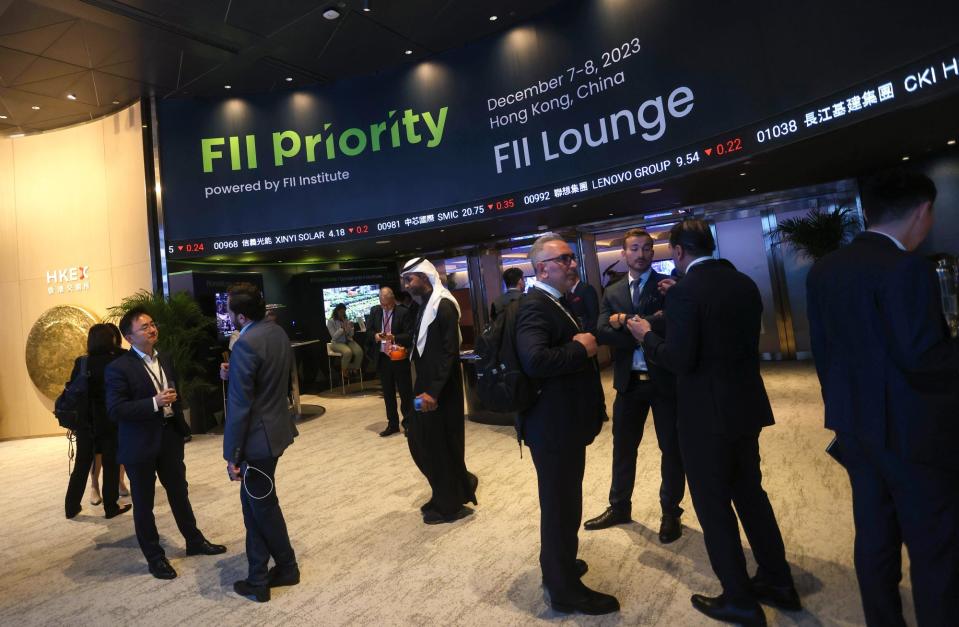FII conference: AI should be allowed to flourish as a human-centric approach will ensure it becomes a 'force for good'
Artificial intelligence (AI) can be a significant tool for uplifting humanity and to serve the common good, provided the right regulations and a human-centric approach to its development are in place, private capital leaders said at the FII Priority conference in Hong Kong.
We are seeing a confluence of technologies coming together all at once, driven by artificial intelligence, Eric Pulier, founder and CEO of Vatom Corporation, said on Thursday during a panel discussion on technology and its impact on the investment landscape.
"Augmented reality, virtual reality, 5G networks, and the emergence of the next generation of artificial intelligence are combining to affect every aspect of society," he added.
Do you have questions about the biggest topics and trends from around the world? Get the answers with SCMP Knowledge, our new platform of curated content with explainers, FAQs, analyses and infographics brought to you by our award-winning team.
More than 1,000 policymakers, business leaders and investors have gathered for the two-day conference in Hong Kong, to discuss the mega trends that will impact the planet's future. It is organised by the Future Investment Initiative Institute, a think tank backed by Saudi Arabia's Public Investment Fund.

FII Priority Hong Kong conference. Photo: Jonathan Wong alt=FII Priority Hong Kong conference. Photo: Jonathan Wong>
Organised in partnership with the city's government and bourse operator Hong Kong Exchanges and Clearing, the event is being held in Asia for the first time. It comes as Saudi Arabia and China forge closer ties that are likely to shape global transformation.
Participants also discussed the ethics surrounding AI and how to navigate the challenges of regulation.
"AI and ChatGPT are in their infancy, and we should not try to stunt AI technology just because of how bad people could use it," said JP Gan, the founding partner of INCE Capital. "We should let technologists be technologists and let entrepreneurs be entrepreneurs, with venture capital firms providing funding for the growth."
Technology can improve efficiency, improve life expectancy, reduce waste, support the environment and improve sustainability, he added.
AI-related investment is forecast to approach US$200 billion globally by 2025, according to an August report by Goldman Sachs.
Generative AI, which uses machine learning to produce original content such as text and images, has enormous economic potential to boost global labour productivity by more than 1 per cent a year in the decade following its widespread usage, the report also showed.
To support the development of technology while cutting the risk of it being misused, regulators must exercise a high degree of transparency and communication, according to Fred Hu, founder and chairman of Primavera Capital Group.
"Government, media, regulators, everyone has to work together - there cannot be too much regulation too early," said Hu.
High standards for regulation, transparency and communication, will help the world create an innovative and safe environment for the development of AI.
Adding a human-centric approach to the development of AI related regulation, will help ensure AI becomes a "force for good", said Pulier.
"If we're going to make tech human-centric, an actual force for good, we have to step back and say we value humanity over and above efficiency, over and above money, capital and everything else," he said.
"Technology provides democratisation, access to markets, access to opportunities and remote working," said Mostapha Tahiri, executive vice-president and head of Asia-Pacific and Middle East and Africa at State Street.
The most prominent trend that emerged during the Covid-19 pandemic was the mass shift towards remote working, Tahiri said. The challenge for policymakers was to ensure inclusivity and that the benefits of technology are made available to everyone, he added.
"Everyone needs to come together to define what are the ethics of transparency, of inclusivity," he said. "We need to govern AI and ensure a basic competitive advantage for everyone in that space."
This article originally appeared in the South China Morning Post (SCMP), the most authoritative voice reporting on China and Asia for more than a century. For more SCMP stories, please explore the SCMP app or visit the SCMP's Facebook and Twitter pages. Copyright © 2023 South China Morning Post Publishers Ltd. All rights reserved.
Copyright (c) 2023. South China Morning Post Publishers Ltd. All rights reserved.

 Yahoo Finance
Yahoo Finance 